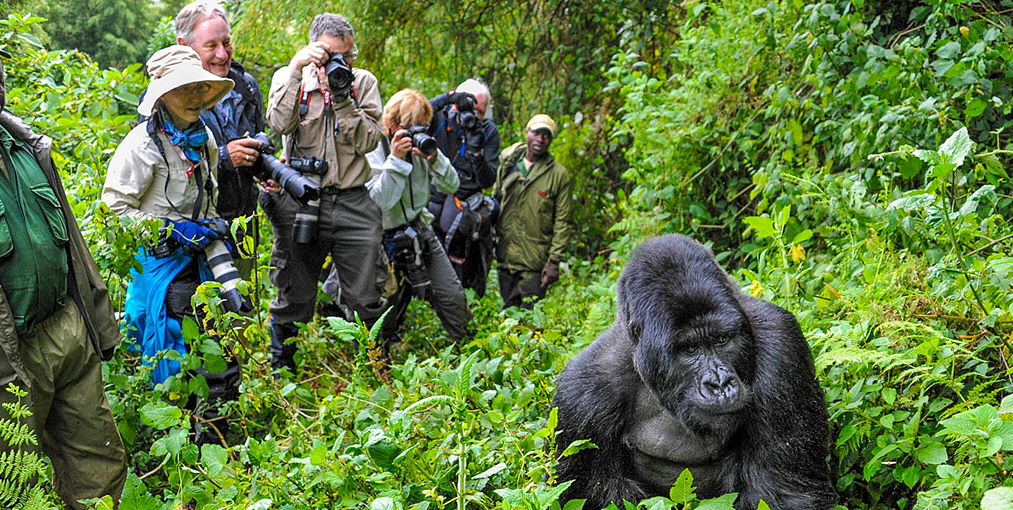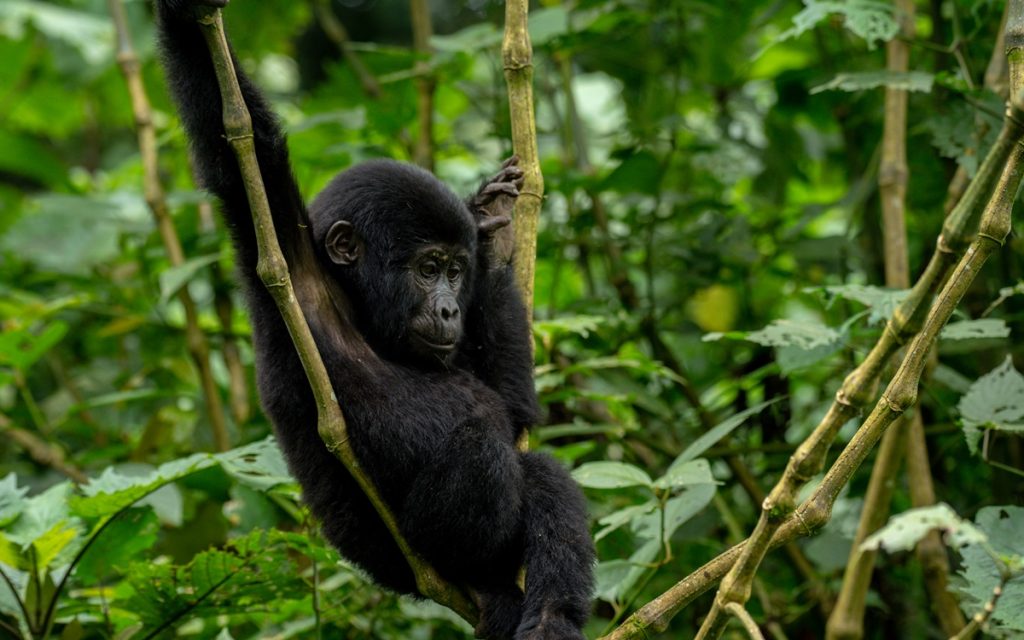- Written by: Friendly Gorillas Editor
- January 4, 2025
The Batwa Cultural Encounter
The Batwa Cultural Encounter
The Batwa people were fierce hunters and gatherers who thrived in the dense forests at the base of the Virunga Volcanoes. They were endowed with old-age knowledge that had been tarnished down through generations. The forest provided them with refuge, food, and medicine.
The Batwa Trail is located in Uganda’s Mgahinga Gorilla National Park, which is renowned for its gorilla trekking opportunities. An indigenous tribe known as the Batwa people used to reside in this park.

The purpose of this cultural encounter event is to educate guests about the history of the Batwa culture. The indigenous people are able to preserve their cultural inheritance by means of publishing, education, and the acquisition of new land.
In order to live in specific camps and settlements outside of the two forests/parks in the Districts of Kanungu, Kabale, and Kisoro, the first generation of Batwa people were compelled to give up their cultural history, customs, and way of life. Not everything has gone as planned, even though the government and other local and international organizations have worked very hard to help ensure a smooth transition to their new settlements.
The Batwa people have not entirely adapted to their new lifestyle and communities. Considering that the trees met all of their needs, they are dealing with new illnesses, inebriation, and chronic poverty—things they had never encountered before.
They may go fruit gathering, honey harvesting, or hunting while in the jungle. Given the outdated techniques still in use, people find it challenging to conduct beekeeping and other farming techniques. The forest is no longer a source of free goods.
They have to toil and plant their own fruit, vegetables, beans and potatoes. Some have turned to making charcoal and fuel by pruning or burning trees. Men and women are frequently seen lugging large amounts of goods to markets to be sold.
There have also been social difficulties. They had to learn to live with the local Bantu tribes after rejecting them for thousands of years. The Bantu neighbors of the Batwa face discrimination and stigmatization due to their distinctive way of life.
They have mostly escaped the notice of their neighbors, who see them as intruders on their land. It is debatable whether they can really be considered citizens of this country given their relative poverty and general difficulties integrating.
Due to these challenges, some of them continue to steal park animals, such antelopes, while others end up as vagrants. There are still plenty of folks who yearn to go back to the forest and their comfortable old home.
The Batwa Trail in Mgahinga
Two of the most inventive programs carried out by the organizations that support the Batwa and the Ugandan government are the Batwa Trail, which is unique to the Mgahinga Gorilla National Park, and the Batwa cultural experience in the Bwindi Impenetrable Forest National Park.
This most recent project of UOBDU, in collaboration with the Uganda Wildlife Authority and the United States Agency for International Development (USAID), aims to provide the Batwa with economic and social empowerment using the proceeds from tourism.
Along the Batwa Trail is one of the best community visits in Uganda. What is the goal of the Batwa Trail and the cultural experience? Either way, it’s an event designed for tourists or travelers who are interested in learning about the history and way of life of the Batwa people.
Upon completion of the experience, tourists will comprehend why the Batwa people have not been able to adapt to life outside of the jungle and why they might not be gaining any benefit from tourism activities such as gorilla trekking.

Mgahinga National Park is the route of the Batwa Trail. This extended experience takes place in the park/forests of Mgahinga, setting it apart from the Batwa cultural tour in Bwindi. Typically, Batwa communities that reside outside of Bwindi Forest participate in the cultural visitation and experience offered by Bwindi.
Typically led by Batwa people, the five-hour Batwa Trail starts when the guide, also a Batwa, kneels to implore the spirits to keep everyone safe as they make their way through the jungle. This antiquated custom made sure that the hunting trips were prosperous and fortunate. Following the spirit prayer, the Batwa guide takes guests into the thick forest and around the flanks of mountains such as Muhavura and Gahinga.
You will discover as you follow the tour that every plant and weed in the forest has significance to the Batwa people. The tour leader will frequently pause to collect leaves from trees and explain their medicinal value. Leaf remedies are available for treating high blood pressure, fever, diabetes, and common colds.
These treatments are typically taken straight from the mouth, crushed, or chewed. You will discover how the Batwa make fire, prepare traditional meals, construct homes, and gather honey, in addition to learning about the forest medicines. You will be impressed by some of the Batwa’s products, such as a bamboo cup, as they were also skilled painters.
The Batwa will tell you tales about their origins, past, and ways of life in the bush as you walk. The Batwa trip usually ends with an investigation of the Garamba caverns. The Batwa place great importance on these serene, gloomy, and old caverns.
Because the king’s residence and the major food store/granary were located there, the Batwa people regard the Garamba caverns as sacred. The Batwa used the caverns as meeting and hiding places when engaged in combat with their Bantu neighbors. Following your tour of the Garamba caverns, you will be taken to see a traditional dance performance by the men and women of the Batwa tribe.
Using the kind revenues from tourism, the Batwa trail in Mgahinga and the Batwa cultural visit in Bwindi have made significant contributions to the social and economic wellbeing of the Batwa community. As tour guides on the Batwa route in Mgahinga, the forest is allowed to return to them, giving them a sense of ownership over the area.
Suggested Safari Itineraries
The Batwa Cultural Experience
The displaced Batwa pygmies founded The Batwa Experience to impart their incredible legacy and customs to the outside world and to educate their children.
Giving guests the chance to learn about and interact with the customs, history, and culture of the Batwa people of Bwindi Impenetrable National Park is the main focus of the Batwa cultural experience.

Tourists visit Batwa communities on guided excursions conducted by Batwa guides. The Batwa guides impart to the guests their knowledge of the forest ecology, therapeutic plants, hunting strategies, and folklore.
The Batwa Trail
Visitors have a rare opportunity to interact with the native Batwa people who inhabited the Mgahinga forest through the Batwa Trail. The Batwa route, in contrast to the Batwa Cultural Experience, takes tourists further into the forest to view the historic Batwa hiding places, hunting areas, and caves.
The walk culminates with a visit to the Ngarama Cave, which the Batwa utilized as a shelter. The trail is located on the lower slopes of Mgahinga. Guides share customs and tales from their time spent in these natural havens within the cave.
For foreign non-residents, the fee of this event is $80; for foreign residents, it is $70; and for East African residents, it is Ug shs. 50,000.
Challenges Faced by the Batwa
Due to deforestation and conservation efforts, many Batwa have lost their native lands and are now forced to work as agricultural laborers on the fields of other ethnic groups. They are now primarily vulnerable and impoverished as a result of this shift.
Many families in the Batwa region are having financial difficulties due to their migration, limited access to educational opportunities, and unemployment. Children from Batwa communities often face barriers to education, such as discrimination and a lack of resources in their communities.
Recommended Safaris
Efforts to Preserve Batwa Culture
In an effort to lessen the problems the Batwa people are facing, steps have been taken to safeguard land rights, educate the populace, and promote cultural preservation.
Curriculum in schools: Governmental and non-governmental organizations work together to provide Batwa children with the opportunity to attend school and acquire skills and literacy.
The Batwa people are receiving better access to healthcare through the implementation of several initiatives, including health education campaigns and mobile clinics.
Some Batwa villages have centered their efforts on preserving their traditional knowledge of forest resources to increase their income.
They have moreover been looking for chances in ecotourism and handicrafts.
Enterprises showing cultural heritage: By presenting Batwa culture, these enterprises help the community get money from traditional crafts and travelers.
The implementation of mobile clinics and health education programs is one project aimed at improving the Batwa people’s access to healthcare.

In conclusion, a fantastic experience you can have when going on a gorilla trekking expedition is walking the Batwa cultural trail. Not only will you be helping a community and raising their standard of living, but you will also be witnessing and participating in some fascinating activities such as the hunting, honey gathering, bamboo cup making, pharmacy visit, and trek to the sacred Ngarama cave.
Friendly Gorillas Editor

Ready for your ultimate wildlife experience?
Chat with us, our team is always here to help!
You may also like …

Got any questions
about traveling to Uganda?
Get in touch.








